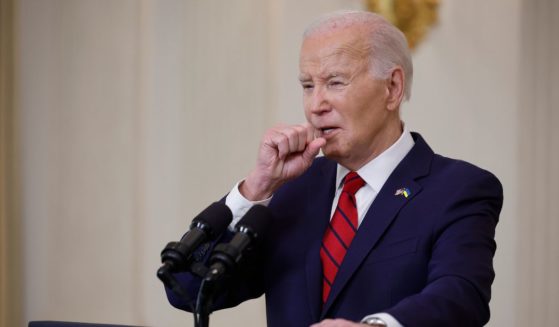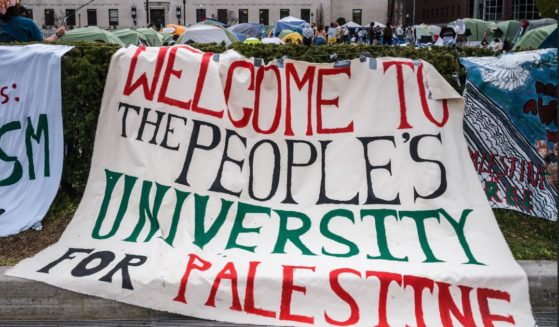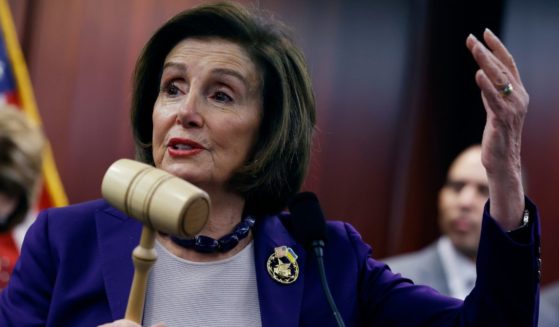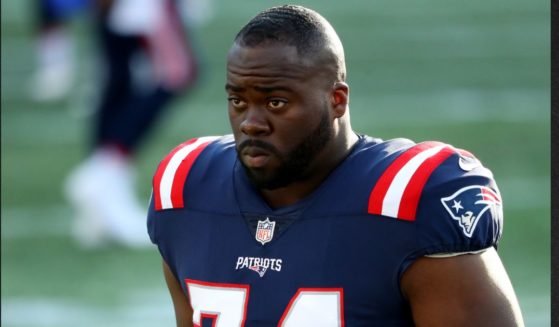Trump Turns from Mic Mid-Speech, Personally Addresses Kavanaugh After Heartfelt Apology
In a speech delivered before Supreme Court Justice Brett Kavanaugh’s swearing-in ceremony at the White House on Monday, President Donald Trump delivered an apology to the newest member of the high court for the acrimony that arose during his confirmation process, arguing that the judge had been “proven innocent” of sexual misconduct accusations.
“I would like to begin tonight’s proceeding differently than perhaps any other event of such magnitude,” Trump said.
“On behalf of the nation, I want to apologize to Brett and the entire Kavanaugh family for the terrible pain and suffering you have been forced to endure.”
Trump added that “those who stepped forward to serve our country deserve a fair and dignified evaluation, not a campaign of political and personal destruction based on lies and deception.”
“What happened to the Kavanaugh family violates every notion of fairness, decency and due process” Trump said.
And then he added a line that would likely have had liberals across the fruited plain shooting out their televisions if their value system allowed them to exercise their Second Amendment rights:
“I must state that you, sir, under historic scrutiny, were proven innocent. Thank you.”
He then turned to Kavanaugh and shook his hand, speaking words only the two of them could likely hear.
Trump’s “proven innocent” line was indeed so triggering to some that it formed the basis of two out of five stories on a special “how much women hate Trump and the GOP” package on CNN’s website:
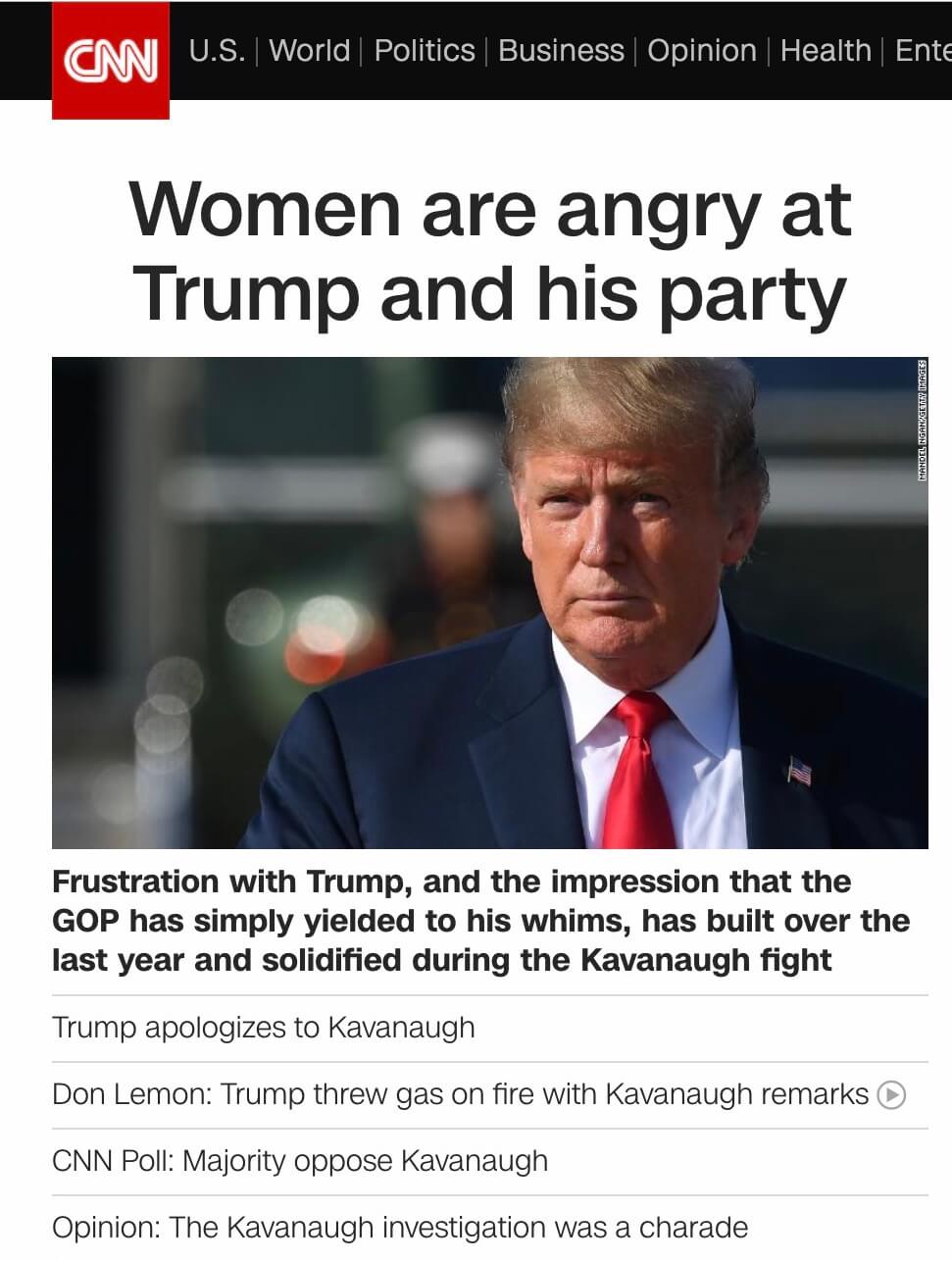
Tune in next week at 8 p.m., when Anderson Cooper hosts a CNN special, “Brett Kavanaugh: Worst Supreme Court justice ever or worstest Supreme Court justice ever?” Special appearance by Dianne Feinstein, fresh from her hospitalization for Kavanaugh-induced rabies.
I suppose it’s probably worth noting that there are few cases in which anyone can really be “proven innocent.”
Unlike on “Law and Order,” where Sam Waterston can magically produce a dramatic confession in the last five minutes of the show, almost every incident of this sort retains some level of factual ambiguity.
That’s especially true when the evidence arrayed against a person is all of the circumstantial variety — or uncorroborated allegations, as was the case here.
It’s worth noting that not just because “proven innocent” might not have been the right choice of words, but because the only people who believe there’s any evidence to support the claims have a working definition of “evidence” that makes argument practically impossible.
Exhibit A, your honor:
I don't know how many times I have to say this but:
A VICTIM'S TESTIMONY IS ACTUAL EVIDENCE. https://t.co/UZUeAJbMSi
— Geraldine Just Follow TheEverywhereist on Threads (@everywhereist) October 5, 2018
Yes, but at some point it has to be corroborated by something. Anything.
Feinstein received University of Palo Alto Professor Christine Ford’s accusation in early July. Between then and Saturday’s confirmation vote, Democrats were able to turn up claims that he enjoyed a tipple or three back in high school. They found that he used weird codes in his high school yearbook, which led to an etymological examination of the phrases “boofing” and “devil’s triangle” that rivaled any probe of the Zapruder film.
They even turned to Michael Avenatti, never a particularly sound idea.
No proof or corroboration actually emerged that Brett Kavanaugh committed sexual assault, mind you. That’s why the phrase “devil’s triangle” became proof of sexual assault — or, at least, that Kavanaugh wasn’t being entirely truthful with the Senate Judiciary Committee. Of course, this glossed over the massive holes in Ford’s testimony, but #BelieveAllWomen.
When it became clear the accusations against Kavanaugh didn’t meet the evidentiary bar required of a trial, liberals insisted this was just a “job interview.” Because most job interviews involve testimony before the upper chamber of Congress on the issue of “boofing,” of course.
This seemed to be an awfully convenient manner to get around the concept of “innocent until proven guilty,” or the fact that implying Judge Kavanaugh was possibly too horrible to sit on the bench was a hideous affront to an individual with a distinguished career and reputation, particularly in the absence of any reliable evidence.
Was Kavanaugh “proven innocent?” Maybe not, because proof in a situation like this is virtually impossible.
But did he deserve that apology? Definitely. And Trump’s delivery of it was a credit — to the president and the country.
Truth and Accuracy
We are committed to truth and accuracy in all of our journalism. Read our editorial standards.






